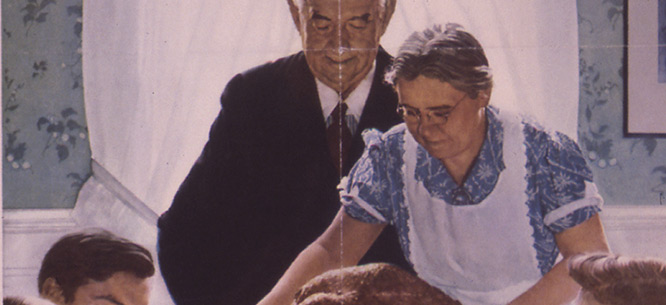Freedom from Abstraction
Freedom from Abstraction

The Four Freedoms: Franklin D. Roosevelt and the Evolution of an American Idea
by Jeffrey A. Engel
Oxford University Press, 2015, 248 pp.
The Fight for the Four Freedoms: What Made FDR and the Greatest Generation Truly Great
by Harvey J. Kaye
Simon & Schuster, 2015, 304 pp.
[contentblock id=3 img=html.png]
In Situation Normal, Arthur Miller’s remarkable 1944 account of his tour of Army training facilities, the playwright found himself frequently discouraged by the lack of open, direct talk about What the War Was For. After a few disenchanting days looking for what he called “the Belief,” Miller wrote, “I hope it is clear that we do have men in our Army to whom ideas are quite as important as beer.” Back on the home front, the radical artist Ben Shahn drew up a poster parodying big business’s overwhelming influence on the war effort: it featured the Statue of Liberty offering the world a Coke and read “The War that Refreshes: The Four Delicious Freedoms!”
Shahn and Miller may have been discouraged by the glibness and superficiality they encountered, but their disillusionment has generally been filed as a minority report in the history of “the Good War.” Shahn’s parody of the “Four Delicious Freedoms” was a reference to a cornerstone of the more idealistic telling of the war—Franklin Delano Roosevelt’s “Four Freedoms,” memorably illustrated by the artist Norman Rockwell in a 1943 series of war bond posters. Two recent books revisit these ideals, arguing that they are central to the past seventy-five years of U.S. history. In The Four Freedoms: Franklin D. Roosevelt and the Evolution of an American Idea, the foreign policy historian Jeffrey Engel has put together a team of leading historians who collectively trace the influence of FDR’s words on political culture up to the present. Harvey Kaye’s The Fight for the Four Freedoms combines a similarly wide-angled view with an activist’s passion, arguing that we no longer have the unstinting commitment to those core freedoms that Roosevelt inspired in an entire generation.
Yet can we take for granted that the Four Freedoms were really so central, so inspiring? As Kaye himself notes, during the war many liberals—like Miller—were dismayed to find that “polls suggested that Americans were not speaking of the war in the idealistic terms expected and that many could not readily explain the country’s war aims . . . [nor could they] precisely name the Four Freedoms.”
True, even if few could remember all four, it is likely that nearly all Americans could name at least one. One of the F...
Subscribe now to read the full article
Online OnlyFor just $19.95 a year, get access to new issues and decades' worth of archives on our site.
|
Print + OnlineFor $35 a year, get new issues delivered to your door and access to our full online archives.
|






